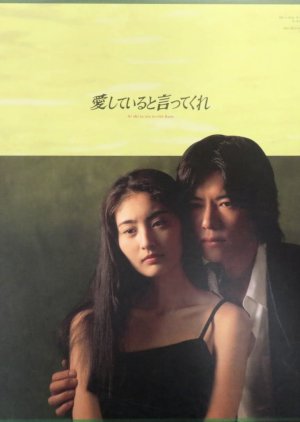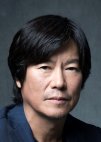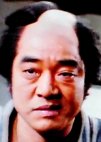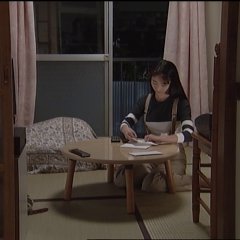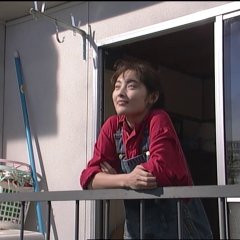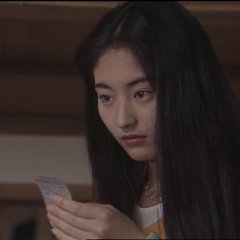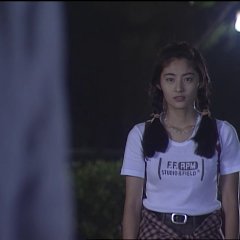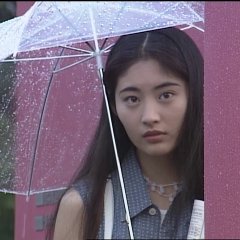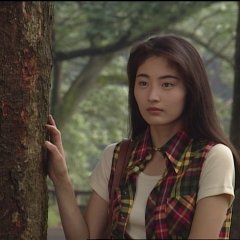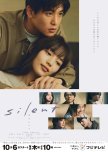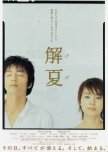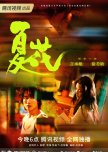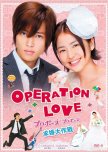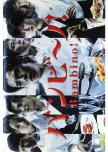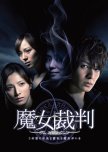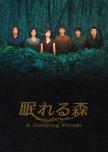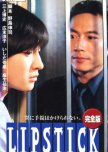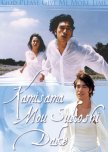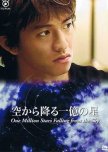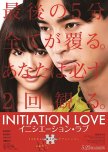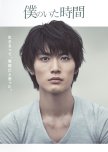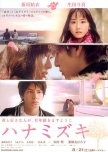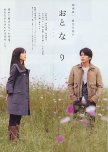 Jung Woo Sung to return to dramas with Shin Hyun Bin as the female lead!
Jung Woo Sung to return to dramas with Shin Hyun Bin as the female lead! No meio de uma metrópole movimentada, como pode haver apenas uma macieira? Por mais que Hiroko pule para tentar colher a maçã, ela não consegue alcançá-la. Felizmente, Kohji passa e colhe a maçã para ela. Kohji é um jovem artista em ascensão que, por ter perdido a audição aos 7 anos, vive apenas se expressando por meio de pinturas. Além disso, Hiroko é uma jovem atriz que pratica atuação com uma trupe de teatro enquanto mantém um emprego de meio período. Os dois se encontram várias vezes no parque até que um dia ela descobre que Kohji é surdo. Por meio de sua atração inicial, Hiroko começa a aprender a língua de sinais japonesa para se comunicar com Kohji e, à medida que seu relacionamento se desenvolve, vários obstáculos também surgem. (Fonte: Inglês = MyDramaList || Tradução = ChrisRegina em MyDramaList). Editar Tradução
- Português (Brasil)
- Русский
- magyar / magyar nyelv
- dansk
- Título original: 愛していると言ってくれ
- Também conhecido como: Aishiteru to Ittekure , Say You Love Me
- Diretor: Nobuhiro Doi, Fukuzawa Katsuo, Shono Jiro
- Roteirista: Kitagawa Eriko
- Gêneros: Romance, Vida, Drama
Elenco e Créditos
- Toyokawa Etsushi Papel Principal
- Tokiwa Takako Papel Principal
- Okada KohkiYabe Kenichi {Hiroko's childhood friend]Papel Secundário
- Yo KimikoKanzaki Kaoru [Shinozaki gallery manager]Papel Secundário
- Yada AkikoSakaki Shiori [Koji's stepsister]Papel Secundário
- Nishimura Junji(Ep. 1)Convidado
Resenhas

Um clássico quase perfeito!
É um drama japonês de 1995, com as peculiaridades da época. Aborda delicamente e metaforicamente os desafios de comunicação entre um pintor "iniciante" de 30 anos surdo e uma atriz iniciante de 20 poucos anos, extremamnete otimista e intensa. É rápido, curto, emocionante e encantador, mas a partir do episódio 5, a história fica um pouco frustrante pela extrema falta de confiança da Hiroko pelo Koji. Ainda assim, vale a penas ser assistido. É um drama quade perfeito, se não fosse pela insegurança constante da protagonista e da história acabar girando em torno, algumas vezes, das mulheres que amam e desejam o Koji.Atuação maravilhosa, trilha sonora, fotografia, ambientação, tudo é maravilhoso (tecnicamente falando). Os atores faziam extensas cenas utilizando a língua de sinais. Foi tão natural e atencioso.

First let me start off by saying Etsushi Toyokawa as the handsome, deaf-mute artist Sakaki Kohji will stir your heart. A wonderfully emotive actor, I just love performers who can express a million feelings with only their eyes and this guy totally nails it. It’s not possible to look at him and not be moved. I thought the female lead went a little overboard with all the ‘aegyo’, but thankfully she toned it down a bit toward the second act. Once things took a more dramatic turn in the latter part of the drama I could see that she had some good acting chops, but unfortunately the material she had to work with was a disservice to her character. Supporting cast were like pestilence, especially Shiori and Ken, but in some scenarios Hikaru too. I was too annoyed by them to care about how they deliver. I just wanted them to go away.
Acting aside, this love story just completely captures you away. I enjoyed watching the unique challenges the male lead's deafness introduced to his life and relationships. The Japanese, as per usual, are masters in depicting regular everyday life in all its sweet mundanity. No flash of wealth, no chauffeur driven chæbols. Just an ordinary slice of life about two young people trying to figure stuff out.
Kohji and Hiroko’s chemistry is apparent from the start. They steam up the screen with every glance, every touch, every intimate embrace; and there's just something wistful & nostalgic about the exchange of love letters written by your lover's hand. I enjoyed the music - repetitive though it was, but certainly fitting and beautifully sung.
For a while there I couldn’t believe I was watching a Japanese drama, because for sure the Japanese just don’t do romance this good, do they? And an older one at that. When I found out the same writer who wrote Orange Days wrote Aishiteiru that pretty much explained it. The sweet sentimentalism, the pure headiness of falling in love, the slow build up of passion, it’s all there. Though this time around it’s the guy who has the disability, their love evokes those same warm, wonderful feelings Orange Days did. I was on cloud nine.
Sadly by ep 9 this setup starts to unravel. It’s not possible for Asians to give us a simple love story without all the nonsensical drama … can they? One hopes, but the sick feeling that blossoms in the pit of your stomach tells you something’s up, and sure enough the usual tiresome drama cliches start to rear their ugly heads. By ep 10 an otherwise well developed script takes a most illogical and drastic turn. Things go from bad to WTF in a minute, and by the final episode the show is irrevocably ruined. I was stunned.
It made it really difficult for me to decide on a rating because the first 8 eps and the last 4 eps, esp the final 3, felt like 2 entirely different dramas. And to add insult to injury the terribly ambiguous, unsatisfying ending left me feeling let down and bitter. Mostly, I felt really bad for Kohji. The guy got a raw deal. I wanted something better for him. He didn’t deserve all that crap. If I were to rate this drama based on the first 8 episodes it easily nets a 10. Not because it’s a masterpiece of any kind, but because the emotions resonate so well & so deeply. In the end my 9 rating here is also a reflection of this fact. Eps 9 - 12 get a 1 because ‘pathetic’ is truly an appropriate label for ensuing events that were totally unnecessary and foolish.
So here’s what I recommend, chingus. Go ahead and watch this show in its entirety at your own risk. But if you need to have or prefer to have a happy or relatively satisfying conclusion to a drama you’re about to invest 12 hrs of your life in, stop after the 8th episode. Arassoyo? Save yourself the grief and just create your own ending. I sure wish I had. Trust me, you’ll thank me later.

